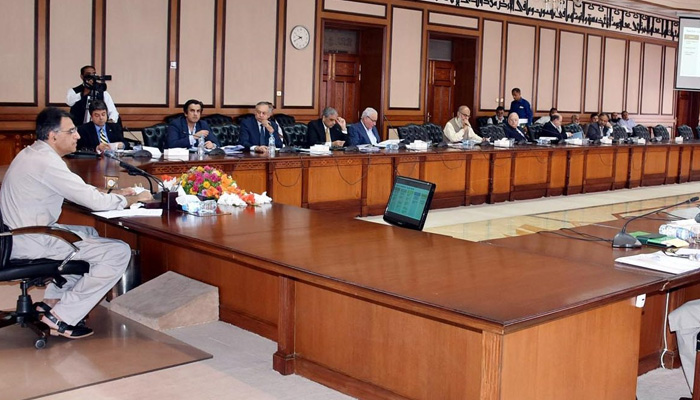ECC again defers gas price hike decision
The Economic Coordination Committee (ECC) of the Cabinet on Monday again deferred an anticipated decision to hike the natural gas prices by 30 to 186 percent, instead deciding to refer the contentious issue to Prime Minister Imran Khan.
ISLAMABAD: The Economic Coordination Committee (ECC) of the Cabinet on Monday again deferred an anticipated decision to hike the natural gas prices by 30 to 186 percent, instead deciding to refer the contentious issue to Prime Minister Imran Khan.
The ECC met here under the chairmanship of Minister for Finance Asad Umar on Monday to review a summary which proposed a massive increase in gas prices at the demand of the main gas utilities, the Sui Northern and Southern companies.
After the meeting, Federal Minister for Information and Broadcasting Fawad Chaudhry said that the ECC did not approve the price hike and would table the proposal to the premier for his final decision.
The gas utilities have sought the increase, in part, to cover sustained losses of mosre than Rs156 billion caused by an increase in the ratio of unaccounted for gas (UFG). Sui Southern wants Rs11 billion to recuperate UFG, while Sui Northern wants Rs10 billion.
The UFG is the difference between the total volume of metered gas purchased by a gas utility and the volume of gas sold. It is mainly due to gas theft from tampered meters and illegal connections, malfunctioning metering equipment, and gas leakage due to higher-than-required pressure from dilapidated pipelines.
Gas prices were not been increased for five years and artificially maintained at Rs234 per MMBTU by the previous Pakistan Muslim League-Nawaz (PML-N) government for popular political gains. Shortly after it stepped down, the Oil and Gas Regulatory Authority increased the gas price on June 24, with a cumulative impact of Rs160 billion a year.
Fawad pointed that the gas companies did not incur a single rupee's loss in 2013, when the PML-N government took office, but have gone down since.
However, both major gas utilities have recently distributed profit dividends to their share holders. The UFG increase shows that technical losses went up in recent years and have to be plugged, rather than passing on the cost to the public. A price increase would not prevent further losses caused by UFG.
A top Petroleum Division official who attended the ECC meeting told The News a decision in principle was taken to increase the gas prices, but in a way that does not fleece domestic consumers.
To achieve that end, the Petroleum Division would increase the number of tariff slabs for domestic consumers to five from the existing three. Domestic consumers who consume 500-600 cubic meters gas a month would not be given any subsidy, but other slabs would be exempted from any price rise.
The ECC decided in principle not to pass on the gas price hike to export-oriented industries including textiles, leather, carpets, surgical and sports goods. They are likely to receive subsidised supplies so as to bring down the cost of doing business and encourage greater exports, sources told The News.
Fawad said that the ECC decided to crack down on increased liquefied petroleum gas (LPG) prices, predominantly used by low income households, and would take the provincial governments into confidence so as to reverse the rise.
The ECC gave the go-ahead to import one million tons of urea fertiliser to meet the requirements of Pakistan's farmers. The government would provide a subsidy of Rs960 per 40kg bag of imported urea.
Fawad said the national requirement for urea fertiliser stood at 5.833 million tons this year, against 5.862 million tons in 2017. The imported urea would cost the government Rs2,575 per 40 kg bag, but would be provided to farmers at Rs1,615 per 40 kg bag.
-
 ‘Narcissist’ Andrew Still Feels ‘invincible’ After Exile
‘Narcissist’ Andrew Still Feels ‘invincible’ After Exile -
 Shamed Andrew ‘mental State’ Under Scrutiny Amid Difficult Time
Shamed Andrew ‘mental State’ Under Scrutiny Amid Difficult Time -
 Bad Bunny's Super Bowl Halftime Show: What Time Will He Perform Tonight?
Bad Bunny's Super Bowl Halftime Show: What Time Will He Perform Tonight? -
 Where Is Super Bowl 2026 Taking Place? Everything To Know About The NFL Showdown
Where Is Super Bowl 2026 Taking Place? Everything To Know About The NFL Showdown -
 Chris Pratt Explains Why He And Katherine Schwarzenegger Did Premarital Counseling
Chris Pratt Explains Why He And Katherine Schwarzenegger Did Premarital Counseling -
 Drake 'turns Down' Chance To Hit Back At Kendrick Lamar At Super Bowl
Drake 'turns Down' Chance To Hit Back At Kendrick Lamar At Super Bowl -
 Sarah Ferguson Had A ‘psychosexual Network’ With Jeffrey Epstein
Sarah Ferguson Had A ‘psychosexual Network’ With Jeffrey Epstein -
 Miranda Kerr Shares The One Wellness Practice She Does With Her Kids
Miranda Kerr Shares The One Wellness Practice She Does With Her Kids -
 Czech Republic Supports Social Media Ban For Under-15
Czech Republic Supports Social Media Ban For Under-15 -
 Khloe Kardashian Shares How She And Her Sisters Handle Money Between Themselves
Khloe Kardashian Shares How She And Her Sisters Handle Money Between Themselves -
 Prince William Ready To End 'shielding' Of ‘disgraced’ Andrew Amid Epstein Scandal
Prince William Ready To End 'shielding' Of ‘disgraced’ Andrew Amid Epstein Scandal -
 Chris Hemsworth Hailed By Halle Berry For Sweet Gesture
Chris Hemsworth Hailed By Halle Berry For Sweet Gesture -
 Blac Chyna Reveals Her New Approach To Love, Healing After Recent Heartbreak
Blac Chyna Reveals Her New Approach To Love, Healing After Recent Heartbreak -
 Royal Family's Approach To Deal With Andrew Finally Revealed
Royal Family's Approach To Deal With Andrew Finally Revealed -
 Super Bowl Weekend Deals Blow To 'Melania' Documentary's Box Office
Super Bowl Weekend Deals Blow To 'Melania' Documentary's Box Office -
 Meghan Markle Shares Glitzy Clips From Fifteen Percent Pledge Gala
Meghan Markle Shares Glitzy Clips From Fifteen Percent Pledge Gala




